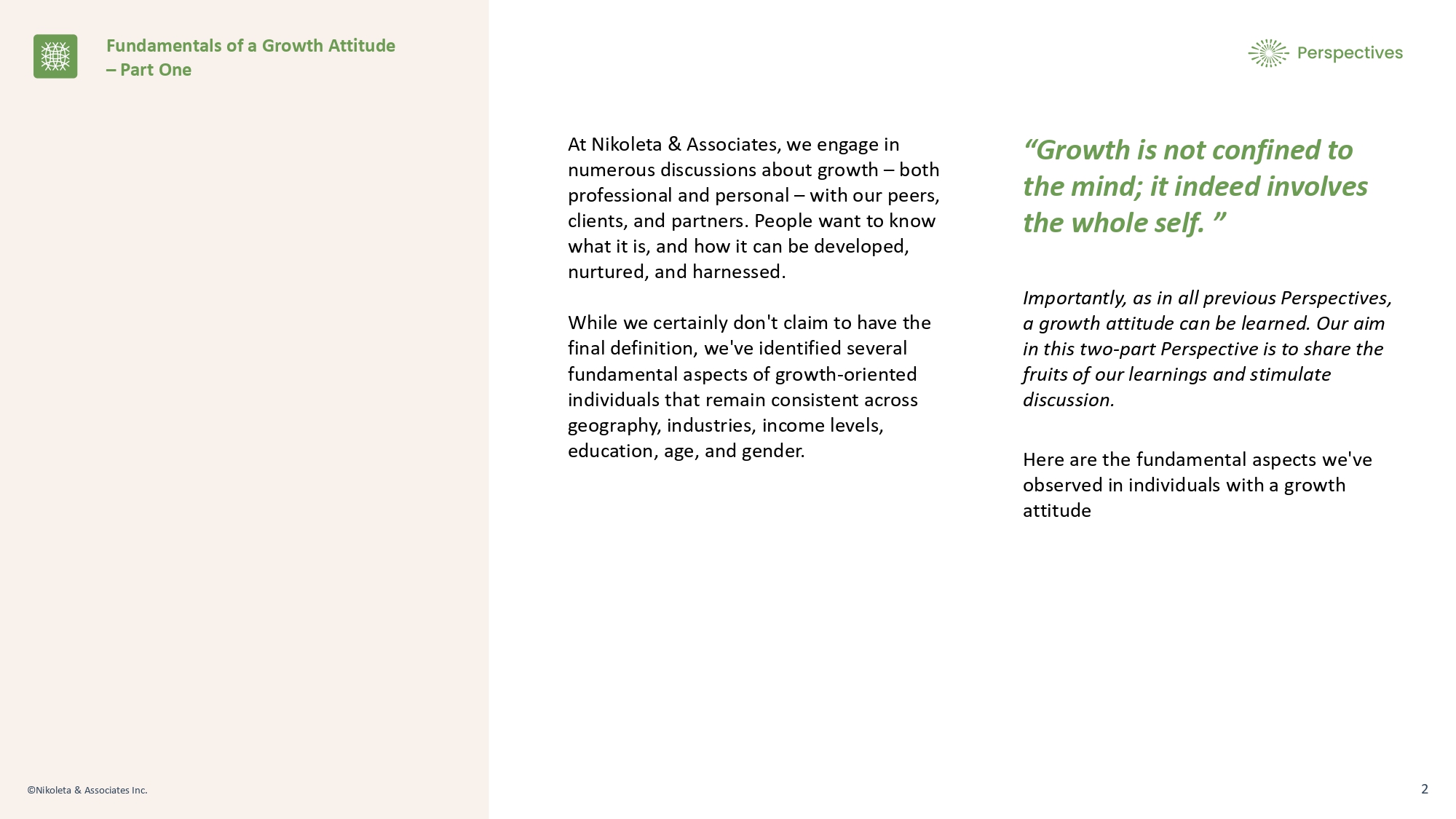Perspective
Fundamentals of a Growth Attitude – Part One


At Nikoleta & Associates, we engage in numerous discussions about growth – both professional and personal – with our peers, clients, and partners. People want to know what it is, and how it can be developed, nurtured, and harnessed.
While we certainly don’t claim to have the final definition, we’ve identified several fundamental aspects of growth-oriented individuals that remain consistent across geography, industries, income levels, education, age, and gender.
Growth is not confined to the mind; it indeed involves the whole self.
Importantly, as in all previous Perspectives, a growth attitude can be learned. Our aim in this two-part Perspective is to share the fruits of our learnings and stimulate discussion.
Here are the fundamental aspects we’ve observed in individuals with a growth attitude:
The belief that people can change
In our experience, this fundamental element underpins the growth orientation above all others. The nature vs. nurture discussion only hints at the full spectrum of the human phenomenon. We’ve found that the self is a process; a person’s self can actually change over time, given the right context and, of course, if change is something they embrace.
Instead of subscribing to a fatalistic view that personalities, futures, and fortunes are preordained and set in immovable stone, those with a growth attitude see life as an ever-evolving process. Something extraordinary happens when people believe that they can change – they do.
It’s impossible to control the what, so let go and focus on the how
While the oft-repeated phrase ‘life is uncertain’ has been rendered almost meaningless through overuse, the unknowns of life can indeed be paralyzing. Very little is in our control: our bodies, livelihoods, job prospects, and marriages can all change abruptly and without warning. Individuals leaning towards growth adopt a resilient attitude, understanding that the only thing they can ever truly control is how they respond to life’s twists and turns.
Comfort with discomfort
Growth is many things, but it is not comfortable. Not knowing the answer, moving far outside one’s comfort zone, or undertaking significant personal and professional changes leads to destabilization, discomfort, and anxiety. Those developing a growth attitude understand that anxiety is a part of them, not a deterrent to action or a reason to self-medicate. As they wouldn’t go into a challenging meeting without their skin, they wouldn’t go in without their anxiety either. The difference is, once growth-minded individuals acknowledge their anxiety, it no longer sets the tone. They remain anxious and do what needs to be done to lead effectively, not in spite of their anxiety, but with it.
There is no ‘end’ to growth
Unlike professional or personal goals, growth cannot be ‘achieved.’ It’s not an MBA. It’s not the summit of Kilimanjaro. It ends when you’re dead, and not before. Growth-oriented individuals understand their own evolution as continuous, grounded in the ongoing learning process that will encompass their entire lives.
The ability to move forward
This is not to say that they ‘give up’ or ‘abandon’ challenging situations or people. Instead, individuals with a growth attitude recognize what they are responsible for and what they can control – themselves, and their reactions. Growth-oriented individuals do not remain in toxic situations. When a professional or personal environment reveals itself to be damaged, stagnant, or delusional, they tend to move on.















